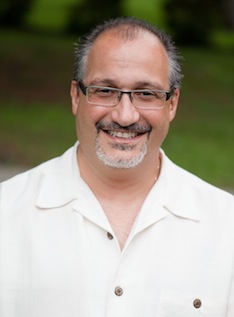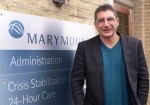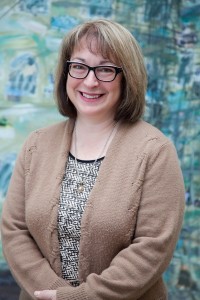Mardy Yager, manager of fund development at Marymound. (photo from Mardy Yager)
Mardy Yager manages the resources of Marymound, the second largest agency in Manitoba that provides support to some of the province’s highest-needs kids. Every day, he has to deal with an overburdened social services system that is struggling to keep up with demand.
A lifelong Winnipegger, Yager has been working in the child welfare field for 26 years. He has been serving at Marymound for the past 15. “I began working frontline with the kids and now I’m the manager of fund development,” he said.
“I have a passion for the kids and intimate knowledge of the work, so I’ve been effective in raising funds and awareness for child welfare here in Manitoba,” he said of his choice of profession, “which isn’t historically a choice for most people.”
When he was 14, his father passed away. Although Yager is not a practising Jew, he feels strongly that his passion for service stems from his Jewish heritage and the example set by his father, who was vice-president of their synagogue, among other things.
Marymound was started in 1911 by Sisters of the Good Shepherd. Yager said he felt privileged to work alongside the sisters when he first began working there, and found their values to be the same as any other religion’s ethics. “You look after those less fortunate, you honor people’s differences, you celebrate other people’s religions,” he said. “Spirituality is very important, regardless of what faith you practise.”
The overwhelming majority of Marymound’s kids – 70% – are indigenous. As such, the focus of Marymound’s assistance is not so much about religion. “That’s kind of how the sisters looked at it as well,” said Yager. “The focus was more on spirituality and healing, and that’s what’s kept me here.”
Marymound’s staff is a mix of professionals with different cultural backgrounds, including indigenous, Christian, Muslim and Jewish. There are more than 300 full-time and another 200 other staff working with approximately 3,000 children annually.
Manitoba has the highest number of children in care (11,000) compared to any other province. For example, the province has almost double the number of Saskatchewan (6,000) despite the fact that the population breakdown of each province is similar.
“The system is overburdened here in Manitoba,” said Yager. “And it’s struggling to meet the needs of all those kids. Some are very high needs. A lot has to do with fallout from the residential schools. Lots has to do with our indigenous populations being marginalized over the decades.
“We also, unfortunately, did the 1960s scoop, where we pulled kids out of their homes and adopted them out to white families all over North America. We’re just starting to understand the issues and making some corrections as to how we approach the problems.”
Most of the kids Marymound works with are dealing with family breakdown, physical and sexual abuse, neglect and poverty. Some are battling mental illness, fetal alcohol syndrome and other issues that mainly afflict the most vulnerable segments of the population.
While Marymound has serviced Jewish kids and still does in their foster-care programs, those percentages are small.

Al Benarroch, executive director of Jewish Child and Family Services (JCFS) in Winnipeg, knows all too well how Marymound and similar organizations help.
“They run some very specific programs around treatment for sexual abuse,” said Benarroch. “Working at JCFS, being a small sliver of child and family services in Manitoba, we work in our own community. But, in my past professional career, when I was in private practice, I used to see a lot of cases of sexual abuse – both in adults who are survivors … and also with youth and children who were in the welfare system because of that.”
But Benarroch was quick to point out that sexual abuse is the smallest percentage under the abuse category – at least on paper – with 10% or 12% of all reported cases of abuse being sexual abuse.
“There is a much higher number being reported of physical abuse, and the highest number is probably neglect,” he said. “What does that mean? Does that mean there’s less sexual abuse or does that mean that it’s underreported? The likelihood is, it’s most likely extremely underreported by virtue of its nature – the nature of the secrecy and the nature of the disruptive levels of trust that a person has when they’ve been victimized.”
While Benarroch said that anyone who can afford counseling can find it very readily, in general, accessing quality, well-trained therapists is difficult for those who are less financially well off.
“With JCFS, we deal with sexual assault very little for a few reasons,” he said. “Number one, our agency is almost exclusively serving the Jewish community. I’m not saying this doesn’t occur in the Jewish community but, as a cultural community, we don’t like to air our dirty laundry. So, as an agency, JCFS is constantly working on raising awareness about these issues so we can peel away those layers of secrecy.”
Benarroch said JCFS sees many more cases in which there has been high levels of neglect and dysfunctional parenting that usually stems from the parents’ past trauma, thereby impacting their ability to parent. In these cases, he said the parents can overcome their challenges and positively parent through talking about childhood experiences, which may involve physical or sexual abuse, to work through those traumatic experiences as adults.
“For me,” added Yager, “it’s always been about the kids and the kids don’t pick and choose. They are just here and we need to help them…. They didn’t ask for the things afflicting them…. We need to do our best to help them get a handle on the issues and go into the community in a productive way.
“Helping those less fortunate, who can argue with that? Right? Those are all things we should all be doing. That’s what makes our country as great as it is, because we focus not just on getting ahead, but on trying not to leave the less fortunate behind.
“I think the values we have here, at Marymound, even though it started from an order of nuns, those values cross all religions.” As an example, Yager said, “I know that philanthropy and caring for others are basic values that all Jews share. We’re quite charitable. It’s also part of the values that the Sisters of the Good Shepherd have provided to us at Marymound.”
For more information, visit marymound.com.
Rebeca Kuropatwa is a Winnipeg freelance writer.




